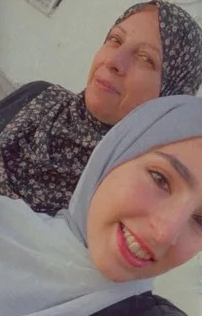My nights in the tent in Nusairat are endless. They feel heavy, with a cold that seeps into my bones despite the five mismatched layers of clothes I wear—all I got.
Sleep has become a distant memory. A luxury stolen by the war that uprooted my life. Once, I would fall asleep effortlessly, cradled by the warmth of my bed and the comfort of familiar walls. Now, each attempt to close my eyes feels like a battle against the biting chill and the relentless ghosts of a life I once knew.

Sara & her mother, Nuha
I live in a tent with my mother, and it is all we have got. Each night, we pull our old worn-out mattresses close together, huddling for warmth.
In mornings, our breaths create tiny clouds in the icy air as we whisper good morning from beneath our blankets, showing only our faces to greet each other with a smile.
Moving feels impossible until the sun rises, its faint warmth coaxing us out of the cocoon we’ve created against the cold.
The day doesn’t bring much relief neither. The tent offers no privacy. Every sound filters through its thin fabric walls. I hear my cousin in the tent next to ours lamenting that she hasn’t slept all night because of the freezing weather. Her voice feels weary, reminding us that our struggles are shared yet solitary.
This cold doesn’t just creep into my body—it steals the simplest joys of life. Studying in the early morning, before the chaos of the day begins, is another challenge. My fingers stiffen, and my hands feel so fragile that holding a pen tightly becomes an impossible task. I feel that my fingers froze that they would break with the slightest movement.
The cold bites at my resolve, but I force myself to try. My studies are more than a routine to me—they’re a lifeline, a defiance against the war that has stripped me of almost everything I cherished.
I think about the winters before the war, when the cold meant something entirely different. It used to be the season of sitting around the fire with Mama, sipping Sahlab* while stories filled the air.
Rain wasn’t a threat; it was a joy, a melody against the windows that lulled me into peace and happiness. Now, the first drop of rain sends me hurrying to inspect the tent’s fragile seams, fearing leaks that could soak our few possessions and make the unbearable even worse.
I miss my friends, too. I miss the warmth of our shared laughter, the way we used to run together to hide from the rain and watch it from a safe place, surrounded by comfort and tranquility. That circle of joy feels shattered now.
Some of them are in Egypt, some have remained in northern Gaza, while others are scattered across the south. Visiting those who are nearby is no longer a simple matter. It would take hours to travel what used to be a half-hour journey, costing more money than I can spare and risking dangers that lurk on the roads during wartime. Our bond, once so effortless, now feels like another casualty of this ongoing war.
The physical toll of this life weighs on me, as well. Ever since the temperature began to plummet the cold of the tent has left me in a constant state of illness. The flu lingers, seemingly permanent, and I’ve been suffering from persistent backache for weeks now. Recovery from even such minor sicknesses takes far longer than it should because I cannot find the medicines I need. My body, worn down by 14 months of war, feels more vulnerable with each passing day.
The psychological weight of these nights is as heavy as the biting cold. The tent, though it offers minimal shelter, feels like a prison that traps me with memories of a life that feels impossibly distant. The shadows of my past creep into my mind: the warmth of my home, the security of being surrounded by four solid walls, and the simplicity of closing my eyes without worry. Each memory is a double-edged sword, bringing both comfort and pain.
Yet, even a midst this relentless cold, there are flickers of hope. The tent’s fragile walls cannot contain the quiet moments of warmth my mother and I share.
Every morning, as we exchange smiles from beneath the blankets, I feel a spark of defiance against the bleakness around us. In the scratch of my pen against paper—despite my frozen fingers—I mumble to myself that this knowledge I am seeing is a form of power, a beacon that guides me forward.
Winter, which once brought comfort, now looms like an adversary. But the season cannot extinguish the resilience I see in my mother’s smile, the quiet endurance of my beloved, or the stubborn hope that refuses to leave me.
As I lie awake, facing my pains of sleep, staring at the faint outlines of the tent ceiling, I dream not just of warmth, but of a future where this cold, this war, and this displacement are memories I’ve overcome. And in the darkness, I remind myself: even the longest winters end, and spring always comes.
~Sara Hegy
Sara Hegy is a 21-year-old English literature student and freelance journalist based in Gaza. She has contributed to Electronic Intifada, We Are Not Numbers, and Palestine Chronicle. In addition to her journalism work, she worked as a an English mentor and translator.
*Sahlab is a Middle Eastern milk pudding, usually served to warm you up on a cold day.
